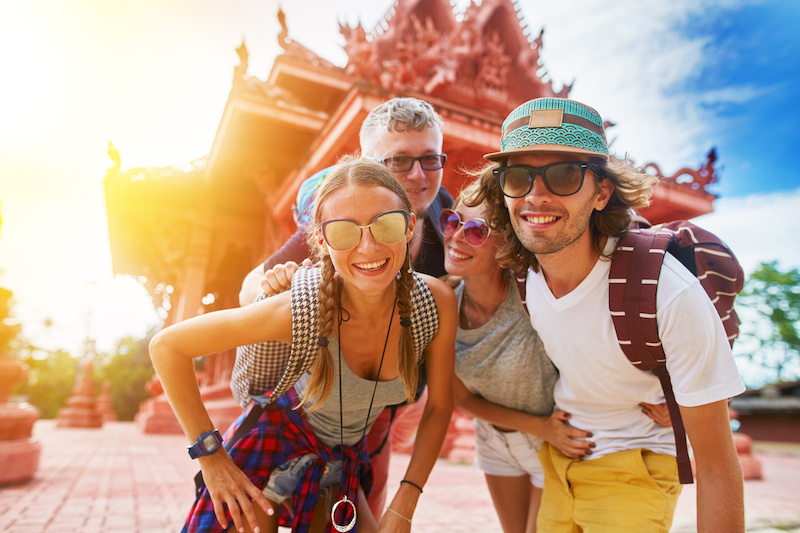Features
‘Next Amsterdam’ hasn’t yet emerged in cannabis tourism
Published on June 17, 2022 by Special to the oz.
 Photo: Adobe/the oz.
Photo: Adobe/the oz. Cannabis tourism is growing around the world as countries and states legalize, creating a potentially lucrative opportunity to cater to a growing segment of travellers interested in experiencing legal pot along with their wanderlust
By Michael O’Regan
Legal cannabis consumption rose in the U.S. and Europe during the COVID pandemic, with some people turning to cannabis to help them cope with lockdowns and broken routines. Meanwhile, fewer people today view it as harmful compared to previous decades.
These factors may have contributed to a trend towards cannabis-related tourism, with destinations developing new holiday products to tempt customers, and rising travel bookings to destinations where cannabis is legal. But there are risks for both destinations and tourists in embracing this trend.
Work by MMGY Travel Intelligence found 29% of leisure travellers are interested in cannabis-related tourism. A study by the Dutch government revealed that 58% of international tourists choose Amsterdam in order to consume drugs. And business in Dutch coffee shops has increased since the start of the pandemic.
Nine months after Illinois legalized recreational cannabis in January 2020, nearly 30% of purchases were by non-residents. Thailand has just announced it has legalized cannabis and is hoping this will boost tourism.
The tourism sector and specific destinations have reacted quickly to the demand for cannabis, hemp and CBD-related products by designing experiences that include those elements. They are also responding to the expected economic potential related to increased hotel occupancy, tax revenues, increased land values, business expansion, jobs and public health and safety benefits that could be connected to cannabis sales.
 Photo: Joshua Resnick/the oz.
Photo: Joshua Resnick/the oz. Yet although tourism to other destinations with legalized cannabis is growing in popularity, data is only beginning to be collected. And so far no destination is ready to be labelled as the “next Amsterdam.”
Cannabis tourism has big potential
While cannabis-related travellers are believed to be high spending and well educated, authorities don’t want to replicate the Dutch model, which led to massive concentration of cannabis coffee shops in Amsterdam and raised concerns over hard drug use and criminality.
New business models are focusing on agri-tourism (meet-the-farmer sessions) and culinary tourism and events such as cannabis festivals. Tourists can choose from farm tours, “bud and breakfast” hotels, city tours, cannabis festivals, cannabis trails, food, wine and marijuana pairings, “ganja yoga”, and packages that combine accommodation and cannabis experiences.
The potential for cannabis tourism is widespread around the world. More than 19 US states and Washington DC have now legalized recreational cannabis, along with Canada, Mexico, Uruguay and others. In Europe, Luxembourg allows the consumption of personally cultivated cannabis, while Switzerland is trialling cannabis sales from pharmacies for recreational purposes.
Malaysia and Thailand have made initial steps towards legalizing recreational use. Costa Rica and Morocco have also approved legalization for medicinal purposes.
Risks of cannabis tourism for tourists
However, few countries have clarified the legality of cannabis use by tourists with legislation directed at recreational use by residents. This means tourists risk breaking the law unintentionally, by interacting with street dealers and police as well as the health implications of consuming real and fake drugs.
There is some evidence cannabis can improve some mental health conditions and provide pain relief. But tourists with pre-existing mental health disorders, for example, may risk their physical and psychological wellbeing. Cannabis-related mental health events including depression can also occur among those who have not been diagnosed with mental health issues.
A patchwork of complicated laws and regulations regarding recreational cannabis use by overseas tourists means questions remain about the legality of consumption, the transport of cannabis vape pens overseas as well as issues of insurance cover and health care, during and after travel.
While Uruguay is planning to allow consumption by tourists, countries like Portugal, where cannabis has been decriminalized since 2001, still doesn’t allow them to buy it legally. In Spain, cannabis clubs allow visitors to donate to the club instead of purchasing a product. But Spain and other large markets like South Africa are focused on domestic cannabis tourism rather than international visitors.
 Photo: Adobe/the oz.
Photo: Adobe/the oz. Few countries have carried out a cost-benefit analysis around legal cannabis and tourism, or fully discussed issues of land and water use, police powers and benefits to local communities. While cannabis tourism can generate tourism and jobs, and reduce the power of organised crime, the goal of sustainable development is threatened by theft, racism, and a market stacked against small local operators who often can not secure funding or insurance. There are also possible increases in pollution and public health and safety concerns.
Mexico and Canada have promised funding for indigenously owned businesses to aid social and racial equality, while New York plans to create a US$200 million public-private fund to support social equity goals. Resident support, and continual conversations with communities on how to plan the sustainable development of cannabis tourism should be a vital part of development of the sector.
While it appears that the COVID pandemic helped stimulate and legitimize the use of cannabis, with dispensaries declared an essential service in parts of the U.S. during the pandemic, tourism could expand and normalize acceptance of its use.
Perceived risks may fade and and tourist guilt may dissipate. Cannabis tourism is likely to become just another segment of the holiday industry.
About the author
Michael O’Regan is a senior lecturer in International Tourism Management at Swansea University in Wales. His research is focused on tourist, urban, historic, future, alternative, lifestyle, slow and cultural mobilities, as well as Airbnb and outbound Chinese Tourism. His PhD study, entitled ‘Backpacker Mobilities: The Practice And Performance Of Travellerscapes in a Global World’, opened up a series of questions about the processes by which distinct forms of tourism emerge, expressing themselves as flows with distinctly mobile patterns of consumption.
—
This story appeared on theconversation.com
Leave a comment on our Facebook page.
© Copyright 2022 Okanagan Z. | About the oz.
Report a Typo or Inaccuracy
We strive to avoid typos and inaccuracies. However, on occasion we make mistakes. We value your contributions and help in correcting them.